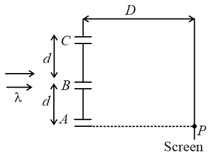Young's Double Slit Experiment
Young's Double Slit Experiment: Overview
This Topic covers sub-topics such as Fringe Width in YDSE, Path Difference in YDSE, Importance of Slit Width in YDSE, Results of YDSE, Importance of Wavelength of Light Source in YDSE, Interference Pattern Produced by White Light and, Conditions for YDSE
Important Questions on Young's Double Slit Experiment
In Young’s double-slit experiment, the two slits act as coherent sources of equal amplitude 'A' and of wavelength . In another experiment with the same set-up the two slits are sources of equal amplitude 'A' and wavelength . but are incoherent. The ratio of the intensity of light at the midpoint of the screen in the first case to that in the second case is ______
Can white light produce interference? What is nature?
What is the importance of slits in Youngs double slit experiment?
In Young's double slit experiment, the slits are apart and are illuminated by photons of two wavelengths . At what minimum distance from the common central bright fringe on the screen from the slit will a bright fringe from one interference pattern coincide with a bright fringe from the other?
Does diffraction take place at the Young's double slit?
Obtain the equation for the bandwidth in the Young's double slit experiment.
In a Young's double slit experiment, the slit separation is doubled. To maintain the same fringe spacing on the screen, the screen to slit distance must be changed to:
What is bandwidth of interference pattern?
In the YDSE experiment, the distance between the slits is and the distance between the slits and the screen is . A light of wavelength is used. What is the maximum path difference in millimeters that is possible between the light from the two slits in this configuration?
The fringe width in the interference pattem obtained on a screen kept at a distance of from the slits in a double slit experiment when light of wavelength is used is . Then find the separation between the slits.
In a Young's double slit experiment, the fringe pattern is observed on a screen placed at a distance from the slits. The slits are separated by a distance and are illuminated by monochromatic light of wavelength The length of the slits is is usually much greater than The slit width is extremely small, and the slits are otherwise identical.
Three equidistant slits are illuminated by a monochromatic parallel beam of light falling normally onto them. The screen is parallel to the plane of the slits and the slit separation . The observation point is directly opposite . It is given that being the wavelength of light. Find the ratio of the intensity at when all slits are open to the intensity at when only one slit is open.

In a single slit diffraction pattern, the distance between the first minimum on the left and the first minimum on the right is . The screen on which the diffraction pattern is displayed is at a distance of from the slit. The wavelength is . The slit width is about . Find the value of .
Two slits in Young's experiment have widths in the ratio . What is the ratio of the amplitudes of light waves coming from them ?
A beam of microwaves of wavelength is propagating towards a rectangular aperture of width . Resultant diffraction pattern is formed on a wall at a distance from the aperture. What is the distance between first and second order outer fringes?
Two white points are apart from each other on a black paper then are viewed from pupil of eye of diameter. What is the maximum distance between them so that they are just resolved by eye? (wavelength of light = )
Light of two different wavelengths is used in young's double slit experiment. Position of third fringe for yellow-orange colour coincides with the position of fourth bright fringe for other colour. What is wavelength of other colour?
In Young's double slit experiment, how many maxima can be obtained on a screen (including central maxima), if (where, is the wavelength of light)?
Two slits are separated by a distance of and illuminated with light of If the screen is placed from the slits. The distance of the third bright image from the centre will be
In Young's double slit experiment, red light of wavelength 6000A is used and then bright fringe is obtained at a point 'P' on the screen. Keeping the same setting, the source of light is replaced by green light of wavelength 5000A and now bright fringe is obtained at the point P on the screen. The value if 'n' is
